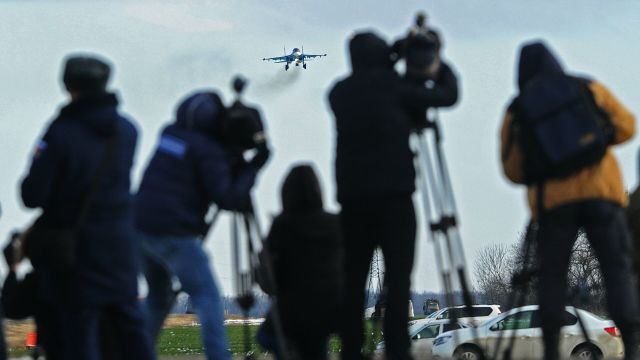Only close cooperation of all structures will help to protect journalists from possible provocations, Union Secretary Timur Shafir said.
MOSCOW, August 7. /tass/. Russian journalists who travel to hot spots, conflict zones or countries unfriendly to the Russian Federation as part of business trips should be supported by the Ministry of Foreign Affairs of the Russian Federation, the Union of Journalists of Russia and other authorized organizations. Only close cooperation of all structures will help to protect journalists from possible provocations, the secretary of the SOHR Timur Shafir, who also heads its international department, told TASS on Sunday.
Earlier, a journalist of the Komsomolskaya Pravda newspaper Daria Aslamova was detained in Kosovo. The incident was announced on Sunday night by Kosovo Interior Minister Jelal Svechlia. According to him, Aslamova was suspected of espionage in order to destabilize the situation against the background of another aggravation of the situation in Kosovo. Later, the Russian woman was released, she is in touch with the Russian Embassy in Serbia.
"Now our colleagues traveling on difficult and dangerous business trips may face more difficulties and provocations than before," Shafir said. "The issue of journalists' safety is not only a matter of their personal actions, the actions of the editorial staff, but also the combined actions of the Foreign Ministry, the Union of Journalists, as well as all other organizations that their fate is not indifferent. The tighter we hold on to each other and interact more closely, the more attentive we are to the trip of each of our colleagues, the better we will be able to ensure their safety."
According to Shafir, the standard recommendations for such business trips are the preliminary preparation of all necessary documents, the presence of two phones with different SIM cards, sending data on movements to the Foreign Ministry, as well as colleagues and relatives.
"A year ago, we could have calmly and systematically enumerated all these important things. But recently, the attitude towards Russian journalists has finally changed, it has moved into the category of relations that are not regulated by ethical, legal, or legislative norms. A Russian journalist traveling to a hot spot, to a country that has strained relations with the Russian Federation, can foresee everything except that the local authorities at some point will want to use him as a hostage, detain him, use him for their own purposes, despite all his rights and international charters," he concluded.
On the evening of July 31, the police of the unrecognized entity closed the checkpoint on the administrative line with Serbia, intending to impose a ban on Serbian documents from Monday. In response, Serbs from the northern part of Kosovo demonstrated and blocked the main highways. Policemen and employees of the International Security Forces in Kosovo operating under the auspices of NATO were pulled to the bridge over the Ibar River connecting the north and south of Kosovska Mitrovica. The result of international efforts was the decision of Pristina to postpone the procedure for imposing a ban on Serbian documents until September 1.

